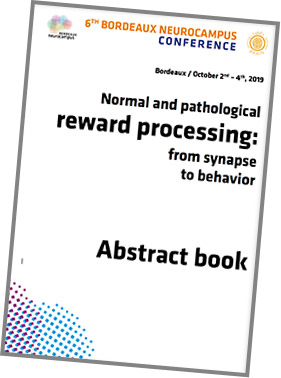Reward - 2019
 Download
Download
the abstract
book (pdf)
Normal and pathological reward processing: from synapse to behavior
October 2nd to 4th, 2019
Essential feature of the human as well as the animal brain is its ability to process information on-line in order to efficiently adapt behavior to a changing environment. The brain constantly integrates new sensory information and adjusts its behavioral responses to maximize reward and / or minimize unpleasant and even dangerous consequences for the organism. The question here is to highlight brain regions that share the ability to “reward” the performance of vital functions such as feeding, exploration of new environments, initiation of new social interactions, reproduction and appropriate reaction to threat.
The mesocorticolimbic dopaminergic system was the first neural circuit to be described in this context and is closely related to the whole reward system. Are there other brain reward systems? What happens in the brains of patients with autism spectrum disorders, addiction to drugs or sports, anxiety or depressive symptoms, Parkinson's disease, whose reward system is altered? Answers to these questions do not reach consensus and will be debated during the three days of this conference.
Scientific committee :
- Stéphanie CAILLÉ-GARNIER
- François GEORGES
- Pierre TRIFILIEFF